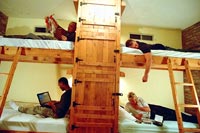Travel Planning |
More planning resources> |
RoadTrip Lodging
Hostels: More Than Just a Cheap Place to Stay by Ben Cooper
From Cape Cod to Cape Flattery, Los Angeles to New York, hostels have been springing up all over the place in recent years. But what exactly is a hostel? And are they really the sort of place in which you'd want to stay? Picture the scenario. Night's closing in. You've been driving all day, and you're tired. You pass a campsite, but you don't particularly want to pitch your tent tonight. A couple of motels flash by, but they're not grabbing you either. Besides, you and your traveling companion want to hang out and meet some different people. Then you see a 'Hostel' sign. Somewhere in the back of your mind you remember reading something in a travel magazine about hostels. "Sure, why not?" you think, and pull over. What might be waiting for you inside? Well, first of all, it needn't necessarily be a youth hostel, to correct just one common misconception. Few places these days have any age limits in place. And it's certainly no low-rent flophouse, either. It's a low-cost establishment designed and built specifically with the needs of travelers, backpackers and road-trippers (of all ages!) in mind. Most US hostels charge between $12 and $25 per night. The concept has been popular elsewhere for many years, but it's still a little new in the United States. The range of cheap motels and hotels that you're likely to find on the road has traditionally covered the same price range. But the appeal of a good hostel is entirely different from that of a motel or hotel. Many of today's hostels are small to medium-sized, independently owned, and aim to provide a homey, personal feel for their guests. Hostels come in all shapes and sizes with facilities varying from place to place depending on climate and surroundings. Most have a variety of shared dormitory accommodation and private rooms, and shared and private bathrooms. Personal safes or lockers where guests can keep their valuables during their stay are invariably provided. The majority of hostels provide kitchen areas where guests can store and prepare their own food, and most have laundry facilities. In addition to these basics, most provide Internet access for their guests. Most hostels have plenty of free parking, so you can just pull up right outside. But the real guiding principle of hostels--their primary reason for being, so to speak--is demonstrated by the fact that most also have a range of features including bar areas, television rooms, and pool or ping-pong tables. These areas are designed specifically so that guests can gather in the evenings to relax, socialize and generally have a good time. And that's precisely why there's no one particular type of person who stays at hostels. The principle is that as long as you're open-minded, happy to talk about your adventures on the road, (and pick up tips from the travels of others!) and not looking for a luxury, five-star suite, then you'll fit right in. By staying at hostels, you can meet a whole range of interesting people who are genuinely involved in the world of travel. This opportunity for connection and conversation is the main way hostels differ from motels or budget hotels. Ideally, everything has been put in place so you can just put your feet up, have a cold drink, and relax in the company of fellow travelers as the fatigue of a day's driving melts away. If that sounds good to you, make a point of staying at a hostel on your next road trip. Ben Cooper
|


